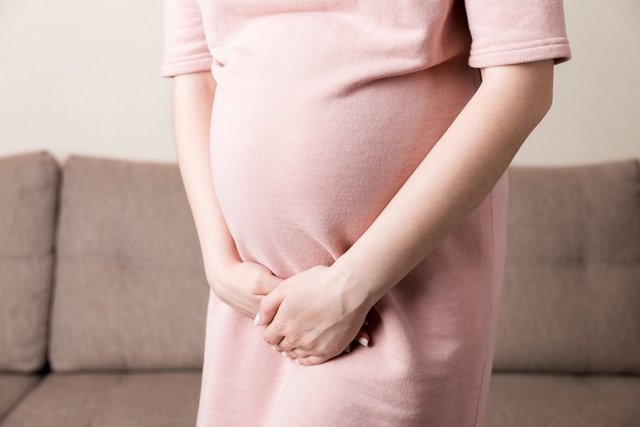Vaginal pain during pregnancy occurs mainly due to the normal development of the baby, which tends to cause pressure on the woman’s intimate area and reduce blood flow, causing pain.
However, pain in the vagina can also be indicative of more serious problems, such as urinary tract infections, sexually transmitted infections or vaginismus, for example.
Therefore, in the presence of very severe pain or other symptoms in addition to pain in the vagina, such as bleeding, itching or burning when urinating, it is important to consult a gynecologist or obstetrician to identify the cause and begin the most appropriate treatment.

The main causes of vaginal pain during pregnancy are:
1. Normal baby development
The baby’s normal development can cause pain or discomfort in the vaginal region, especially from the 3rd trimester onwards. This happens because the baby’s weight gain increases pressure on the pelvic floor muscles, causing tension and discomfort.
Furthermore, due to the pressure exerted by the growing baby, it is possible that there is a decrease in blood flow to the pelvic region, which can cause the vagina to become more swollen and cause pain. Learn about other common changes in the third trimester of pregnancy.
What to do: There are some ways to try to relieve pressure and reduce pain, such as avoiding standing for long hours, placing a cold compress on the pelvic area and resting. Although this discomfort is normal at the end of pregnancy, it is important to consult an obstetrician if the pain is very intense and prevents the woman from walking, carrying out normal daily activities or if it is accompanied by bleeding, for example.
2. Dryness of the vagina
Vaginal dryness is a relatively common problem during pregnancy and occurs mainly due to the increase in the hormone progesterone and the anxiety that women feel due to the rapid changes that occur in their lives. Therefore, as a result, it is possible to have a decrease in vaginal lubrication, which can cause pain during sexual intercourse.
What to do: It is important to identify the cause of dryness, and it is important to consult a gynecologist so that the need for lubricants, changes in eating habits and/or the practice of activities that help reduce anxiety can be assessed, for example. See how to increase female lubrication and combat vaginal dryness.
3. Intense sexual intercourse
Pain in the vagina during pregnancy can appear after intense sexual intercourse in which, due to friction caused during penetration or lack of lubrication, there may be irritation of the vagina, swelling and pain.
What to do: Before starting penetration, it is essential that the woman is lubricated to avoid injuries to the vaginal wall and pain during sexual intercourse and, for this, it may be necessary to use lubricants. However, in this case it is also advised to reduce the frequency and intensity of sexual intercourse, as this way the vagina can “recover” more quickly, reducing pain. In cases where bleeding is also noticed during sexual intercourse, it is essential that a gynecologist is consulted.
4. Vaginismus
Vaginismus occurs when the muscles of the vagina become contracted and cannot relax naturally, causing pain in the vagina and difficulty in penetration. This situation can arise during pregnancy or persist since before pregnancy.
What to do: In this case, it is important that a gynecologist or pelvic physiotherapist is consulted, as it is necessary to carry out an assessment of the pelvic muscles to identify the cause of vaginismus and, thus, indicate the most appropriate treatment. Find out more about vaginismus.
5. Allergy in the intimate region
Allergy in the intimate region can happen when pregnant women use products such as soaps, condoms, vaginal creams or lubricating oils, which contain irritating ingredients, which can cause swelling, itching, redness and pain in the vagina.
What to do: It is important to identify the product that caused the allergy and stop using it. To alleviate symptoms, you can place a cold compress on the outside of the vagina. However, in cases where symptoms do not improve or become more intense, it is important to go to the obstetrician to identify the cause and start appropriate treatment. Find out the symptoms of condom allergy and what to do.
6. Urinary tract infection
Urinary tract infections are a common occurrence during pregnancy, because the changes that occur in the body can favor the development of bacteria and fungi naturally present in the vaginal region. Therefore, it is possible for women to experience pain and discomfort in the vagina, itching, burning when urinating and cloudier urine.
What to do: As this is an uncomfortable situation, it is important that the pregnant woman consults a gynecologist so that the most appropriate treatment can be indicated, which may include the use of antibiotics or antifungals, for example. Furthermore, it is important that the pregnant woman drinks plenty of water during the day, eats a light, low-sugar diet, and wears light, comfortable clothing and cotton underwear. Find out more about urinary tract infections during pregnancy.
7. Sexually transmitted infections
Sexually transmitted infections, known as STIs, can cause pain in a pregnant woman’s vagina, as is the case with chlamydia or genital herpes and, in addition, can also cause itching and a burning sensation.
What to do: In the presence of symptoms that could indicate an STI, the pregnant woman should go to the gynecologist to have the infection confirmed and appropriate treatment indicated, which may involve the use of medications depending on the disease, in addition to being recommended not to have sexual intercourse during the treatment, as well as the partner also undergoing the treatment, this way it is possible to avoid reinfection and risk to the baby. See what the main STIs are in pregnancy and what to do.
8. Bartholin’s cyst
Pain in the vagina during pregnancy can also happen when there are cysts in the Bartholin glands, which arise due to obstruction of the gland, which can cause pain and swelling in the vagina, especially in cases where there is inflammation of the gland.
What to do: If symptoms of inflammation of the Bartholin gland appear, it is important to consult a gynecologist so that the vagina can be assessed and the most appropriate treatment can be recommended, which usually consists of using pain medication and antibiotics if there is an associated infection. Check out what the treatment for Bartholin’s cyst should be like.

Sign up for our newsletter and stay up to date with exclusive news
that can transform your routine!
Warning: Undefined array key "title" in /home/storelat/public_html/wp-content/plugins/link-whisper-premium/templates/frontend/related-posts.php on line 12
Warning: Undefined array key "title_tag" in /home/storelat/public_html/wp-content/plugins/link-whisper-premium/templates/frontend/related-posts.php on line 13



